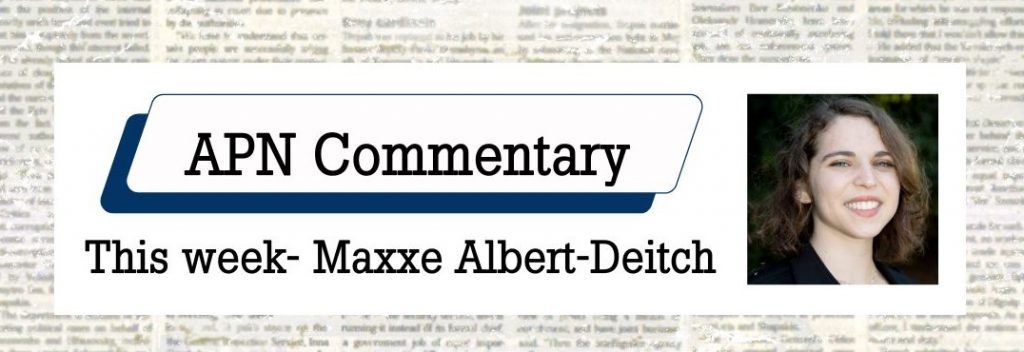
Maxxe Albert-Deitch is Americans for Peace Now's Strategic Communications Coordinator. Prior to joining APN, she worked as a historian, focusing on research and projects engaging in ethnohistory, archaeology, and conflict transformation in Israel and Palestine. She earned a Master’s degree in History from the College of William and Mary.
Stop for a moment.
Take a deep breath.
Exit out of your social media apps. Yes, even Instagram– the cute dogs and the memes about Mr. Pommel Horse
Guy and the endless barrage of photos of hostages who are still missing and Palestinian kids who are starving will
still be there when you log back in.
Count to ten, or thirty, or sixty. However long it takes to slow your thoughts.
Tomorrow will be, according to many, the saddest day in the Jewish calendar– it’s Tisha B’Av, when we
remember the destruction of both Solomon's Temple by the Neo-Babylonian Empire and the Second Temple by the Roman
Empire. It’s a fast day– we’re meant to reflect on the hardships that the Jewish people have endured. Some
communities focus on just the destruction of the Temples. Others expand the meaning of the day and talk about the
Holocaust, the expulsions from England and Spain, the deaths of martyrs and prophets throughout Jewish history and
mythology alike.
For many of us, it feels as though it’s just another day this year. It’s not a separate, special
twenty-five-hour mourning period— it’s just another day in the seemingly endless stretch of mourning that began on
October 7th. It’s been over 300 days since we watched from our phones and our laptops as Israel was invaded, as the
hostages were kidnapped, as hundreds of people were murdered. And then we sat, at first in our anger and then in
yet more grief and horror, as Israel’s strikes on Gaza crossed the line from “retaliatory” and “rescue-oriented”
into the territory of “punitive” and “relentless” and “vengeful.”
It feels almost useless to talk about the ninth of Av as the most calamitous day of the year when so many in
our own communities have been neck-deep in personal, present-day calamity for the last ten months. My own heart
sinks a little bit when I think about the rampant antisemitism that seems to lurk behind some websites, social
media platforms, and forums about how to help people in Gaza. It sinks even deeper when I try to think about how
best to actually help people in Gaza.
I miss the idea of “normal.” I’m tired of living through what the news cycle continues to call “unprecedented
times.”
And yet, in some ways, what we’re experiencing right now is normal.
Historically speaking, the years of peace that most of us have known our whole lives are an abnormality, an
outlier. That fact shouldn’t be news to us. People– Jewish and Arab, American and Israeli and Palestinian, people
from every creed and nationality around the world– have existed in times of turmoil and intentional
extinction and genocide and horror since long before the generations that live on this planet right now. This is,
realistically, the precedent.
And on a day like Tisha B’Av, when we reflect on just how far back our communal history of grief goes, we should engage in another longstanding Jewish tradition: Empathy. Loving the stranger, for you were a stranger. Making the world a safer, softer place for the generations to come– for our own community and for the larger community of the human race. I don’t have all of the answers. Most days I feel like I don’t have any answers. But I know in my bones that existentialist despair and constantly assuming the worst of people who don’t look like me can’t be the solution to the grief we all feel.
This is what we do— time and time again, we sit with our pain, together. We feel the hurt and the sadness and the horror. And we do our best to lift ourselves– and others experiencing the same kind of hurt– out of the pain.
The sun sets.
We sit with our families, or our pets, or alone with our thoughts in the dark. We have a meal.
And the next day, we get up. We brush the sleep from our eyes. And we keep going, determined to continue working for a better world.